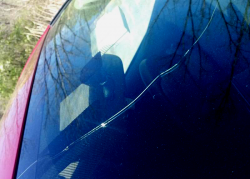
— A Toyota Prius windshield replacement lawsuit alleges cracks and chips in the glass cost owners hundreds of dollars to replace the windshields with ones that are as defective as the originals.
The proposed class-action lawsuit includes 2016-2017 Toyota Prius cars with alleged defects that cause visibility problems and safety issues related to the weak windshields.
According to the plaintiffs, Toyota dealers routinely deny warranty coverage for cracked windshields by blaming the damage on road debris and rocks, even though the plaintiffs claim some windshields have cracked while the cars were parked.
Prius owners typically pay between $400 and $800 for replacement windshields, and in some cases pay even more to fix front camera systems once the old windshields are removed.
Prius drivers report the smallest impacts to the windshields can cause small cracks that suddenly spread across the glass, and trying to get a replacement windshield can sometimes be tough because they are allegedly backordered.
The lawsuit alleges more than 200,000 model year 2016-2017 Prius cars could be affected by the class-action lawsuit, but Toyota says the plaintiff's arguments don't hold up according to the law.
Toyota's attorneys told the judge that Prius windshield breach of warranty claims cannot proceed as a nationwide class-action based on Fifth Circuit precedent.
In Cole v. General Motors Corp., the Fifth Circuit denied nationwide class-action certification for warranty claims brought against GM based on the wide variation in state warranty laws.
According to Toyota, the judge should not allow a nationwide Prius class-action because the lawsuit includes owners and lessees whose vehicles never experienced any windshield problems. Toyota told the judge the plaintiffs incorrectly assume customers alleged overpayments for the cars entitle those customers to recover damages.
Lawyers for Toyota argue by proposing the inclusion of “[a]ll persons or entities . . . who are current or former owners and/or lessees of a Class Vehicle,” the plaintiffs improperly include customers whose state laws would not allow them to recover damages.
In addition, Toyota says the plaintiffs concede the express warranty requires owners and lessees to take their vehicles “to an authorized Toyota dealership” for warranty service. But the class-action Prius lawsuit includes customers who never took their vehicles to dealerships.
In addition, Toyota says all the named plaintiffs except one fail to allege they brought their vehicles to an authorized dealer. At best, Toyota claims the plaintiffs only contacted dealers.
Furthermore, the automaker says the plaintiffs make claims about design defects involving the windshields, but the new vehicle warranty omits design defects. And Toyota's lawyers say there are still problems even if the plaintiffs intend to only plead a manufacturing claim.
First, Toyota told the judge the plaintiffs do not allege their vehicles deviate from their planned specifications, something that is required for a manufacturing claim. The plaintiffs instead allege all the affected Prius cars suffer from the exact same defect.
This, according to Toyota, means the plaintiffs have not alleged a manufacturing defect but have alleged a design defect which is not covered by Toyota's written warranty concerning “materials and workmanship.”
According to the motion to dismiss, the judge should toss out express warranty claims because the plaintiffs mischaracterize the new vehicle limited warranty as a contract then cite only California law for this proposition. Owners allegedly ignore laws that would apply to customers from other states such as Maine, Missouri and Texas.
The Toyota Prius windshield replacement lawsuit was filed in the United States District Court for the Eastern District of Texas, Sherman Division - Squires, et al., v. Toyota Motor Corporation, et al.
The plaintiffs are represented by Cafferty Clobes Meriwether & Sprengel LLP, Gray Reed & McGraw, and McCune Wright Arevalo LLP.
CarComplaints.com has complaints about cracked windshields in 2016 Toyota Prius and 2017 Prius cars.




